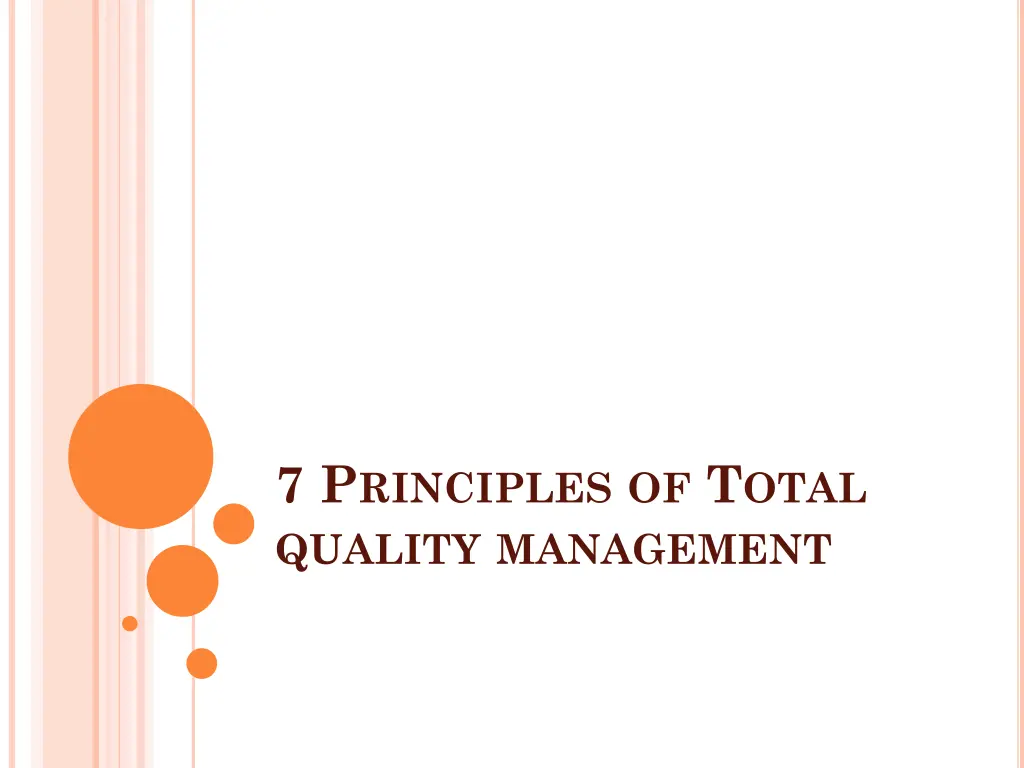
Total Quality Management Principles Overview
Learn about the 7 principles of Total Quality Management (TQM) which focus on managing quality, processes, problem-solving, employee responsibility, measurability, and continuous improvement. Implementing TQM can enhance internal processes, reduce costs, improve performance, and increase customer satisfaction.
Download Presentation

Please find below an Image/Link to download the presentation.
The content on the website is provided AS IS for your information and personal use only. It may not be sold, licensed, or shared on other websites without obtaining consent from the author. If you encounter any issues during the download, it is possible that the publisher has removed the file from their server.
You are allowed to download the files provided on this website for personal or commercial use, subject to the condition that they are used lawfully. All files are the property of their respective owners.
The content on the website is provided AS IS for your information and personal use only. It may not be sold, licensed, or shared on other websites without obtaining consent from the author.
E N D
Presentation Transcript
7 PRINCIPLES OF TOTAL QUALITY MANAGEMENT
Total Quality Management (TQM) to improve their internal processes and increase customer satisfaction. When it is properly implemented, management can lead to decreased costs related to corrective or preventative maintenance, better overall performance, and an increased number of happy and loyal customers. is an approach that organizations use this style of
1. Quality can and must be managed repetitive cycle of chaos and customer complaints. They believe that their operations are simply too large to effectively manage the level of quality. The first step in the TQM process, then, is to realize there is a problem and that it can be controlled. Many companies have wallowed in a
2. Processes, not people, are the problem won t matter how many times you hire new employees or how many training sessions you put them through. Correct the process and then train your people on these new procedures. If your process is causing problems, it
3. Dont treat symptoms, look for the cure problems in the process, you will never be able to fully reach your potential. If you just patch over the underlying
4. Every employee is responsible for quality workers on the line to the upper management, must realize that they have an important part to play in ensuring high levels of quality in their products and services. Everyone has a customer to delight, and they must all step up and take responsibility for them. Everyone in the company, from the
5. Quality must be measurable effective when you can quantify the results. You need to see how the process is implemented and if it is having the desired effect. This will help you set your goals for the future and ensure that every department is working toward the same result. A quality management system is only
6. Quality improvements must be continuous Total Quality something that can be done once and then forgotten. It s not a management phase that will end after a problem has been corrected. Real improvements must occur frequently and continually in order to increase customer satisfaction and loyalty. Management is not
7. Quality is a long-term investment You can purchase QMS software that will help you get things started, but you should understand that real results won t occur immediately. TQM investment, and it is designed to help you find long-term success. Quality management is not a quick fix. is a long-term
THANK YOU FOR LISTENING! Prepared by: Jeraldine Faye A. Rea Jennylyn Tacuban Sharlene Directo Michelle Timoteo
Choose one of the principles of TQM and explain in your own words ?
